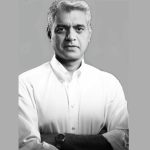Podcast Themes
Multiple perspectives on a topic that you are curious about!
Jaspreet speaks about how he thought about “flipping the donut” in terms of the mix of earning and learning. He also speaks about how he got provoked in one of the leadership workshops about how he was wearing his work identity too tightly.
Related:
Keeping the identity small
Keeping the identity small

Alan speaks about Bill Campbell’s journey and the various transitions he has been through – from being a Football Coach to becoming a Business Executive to Leadership Coaching where he worked with several luminaries such as Steve Jobs, Founders of Google, Eric Schmidt, Sheryl Sandberg, Al Gore. He also speaks about how Bill transitioned from one canvas to another and what stayed the same across these stints.

Having moved from the army setup to the corporate world then onto a government organization and back to the corporate world, Raghu has worn many hats in his professional life. All of these shifts have involved transitioning across cultures- some well-established, others being established and yet others, desperately needing a change in culture! Hear Raghu talk about how he navigated these transitions to integrate into the organization he joined.

Raghu talks about how we could think about leveraging the pool of leadership talent that the army produces. He compares India to markets such as US, where there have been generations of Corporate Leaders who spent their early years in the Armed Forces. This is not just about providing an education around some of the elements of business. It is a complete rewiring that needs to happen.

Jeffrey speaks about being true to oneself as a limiting construct. He says that by being true to some version of self in the past, we might be limiting our possibilities.

Michiel speaks about the arc of his journey and how he shifted trajectories over time and over time his interests and passions shifted from Sales, Marketing and General Management at Unilever to driving Personal Transformation at McKinsey and beyond.

Dan speaks about his journey from qualifying as a lawyer to what he does now. He also shares his insights around what drives his wide arc of curiosity which has led to him writing about the Mind, the process of Selling, Regret, the Science of Timing and a book about careers in the Japanese comic art form – Manga!

Ravi speaks about the notion of punctuated equilibrium where long periods of stability are punctuated with occasional periods of extreme change. He speaks about such periods of extreme change can lead to a new kind of species flourishing on the other side of the change.

Ayse speaks about her origins growing up in Turkey in a family of lawyers. She speaks about how she moved towards architecture and subsequently into Industrial Design. She goes on to describe how the Financial Crisis of 2008 got her started in the space of Life Design. Related Insights from: Bruce Feiler-70.07-Shape-Shifting instead of Resilience (https://playtopotential.com/audio/742)

Rajiv speaks about how he thought about stepping off the corporate track despite being on a very good wicket at Franklin Templeton. He speaks about the growing dissonance within and the quest for purpose and self-improvement that led him to this path.

Lloyd speaks about hitting the pause button in 1993 when he got to a position of success and influence. He also speaks about how he manages to build some deep reflection time in the middle of his busy life. He goes on to reflect on the words from the song by Michael Card – it’s hard to imagine the freedom we find from the things we leave behind.

Dan speaks about how we can think about our strengths when we are at an inflection point. He goes on to say that recognizing our strengths is not about being stuck to the past but really about stretching into new areas that could help us lead a more authentic life and sometimes cues for this could come from domains outside of work.